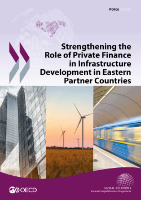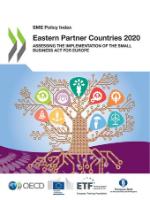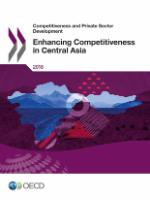OECD Eurasia Competitiveness Programme Publications
Find all the publications from the Eurasia Competitiveness Programme.
Search by country
 Afghanistan Afghanistan |
 Armenia Armenia |
 Azerbaijan Azerbaijan |
 Belarus Belarus |
 Georgia Georgia |
 Kazakhstan Kazakhstan |
 Kyrgyzstan Kyrgyzstan |
 Mongolia Mongolia |
 Republic of Moldova Republic of Moldova |
 Tajikistan Tajikistan |
Ukraine |  Uzbekistan Uzbekistan |
Search by topic
 |
Fostering Business Development and Digitalisation in Georgia The Government of Georgia has made significant policy efforts in recent years to build an environment conducive to private sector development and entrepreneurship, and to support small and medium-sized enterprises in particular. The OECD has supported this reform impetus, working closely with the Ministry of Economy and Sustainable Development to help identify gaps and develop relevant measures to create a conducive policy environment for Georgian SMEs. Fostering SME development and digital transformation helps increase productivity, in turn fostering stronger, more diversified and dynamic economies. This report is the result of two work-streams. The first part summarizes the assessment and recommendations provided by the OECD for Georgia’s SME Development Strategy 2021-2025 and first related Action Plan, highlighting the measures that have been implemented and the additional steps that could be considered for future action plans over the implementation period. The second part is dedicated to SME digitalisation in Georgia, taking stock of the current state of play in terms of both framework conditions and dedicated support programmes for SME digitalisation, and providing policy options to accelerate the digital transformation of SMEs. |
 |
Promoting Enterprise Digitalisation in Azerbaijan The Covid-19 crisis has given renewed urgency to efforts to support the digitalisation of SMEs. However, many SMEs lag behind larger firms in the digital transition as a result of important barriers with respect to skills, innovation, infrastructure, regulation and finance. The SME digital gap slows productivity growth and increases inequalities among people, firms and places. In this context, the Government of Azerbaijan requested the OECD’s assistance in supporting the design and implementation of strategies and policies to foster the digital transformation of Azerbaijan’s SME sector. This note summarises the main findings of this joint work and provides analysis and policy recommendations to: (i) adopt a whole-of-government approach to digitalisation, (ii) create framework conditions for SME digitalisation, and (iii) promote the adoption of digital solutions by SMEs. The note served as a basis for discussion during a peer review of Azerbaijan at the OECD Eurasia Competitiveness Roundtable. |
 |
Beyond COVID-19 Advancing Digital Business Transformation in the Eastern Partner Countries (2021) Digital technologies have spread rapidly in recent years and found new applications in many dimensions of our societies, whether in health, education, communication, the business sector or the delivery of government services. The COVID-19 pandemic has further accelerated these trends, and digital solutions have helped households, firms and the public sector cope with repeated lockdowns and continue their operations. In the process of digital adoption, small and medium-sized enterprises (SMEs) face a clear opportunity to introduce fundamental changes to the way they do business, experiment with new technologies and ultimately increase productivity. Nevertheless, digitalisation comes with its own specific set of challenges, such as widening inequalities caused by digital divides, and there is an important role for policy in creating an enabling environment that helps SMEs succeed on their digital journeys |
STRENGTHENING THE ROLE OF PRIVATE FINANCE IN INFRASTRUCTURE DEVELOPMENT IN EASTERN PARTNER COUNTRIES
| Strengthening the Role of Private Finance in Infrastructure Development in Eastern Partner Countries (2020) Усиление роли частного финансирования в развитии инфраструктуры в странах Восточного партнерства (2020) Given the scale of infrastructure investment required over the coming decades, Eastern Partner (EaP) countries, like most countries around the world, are seeking to mobilise more private finance for infrastructure development. Strengthening the role of the private sector in infrastructure offers an opportunity to scale up investment in quality infrastructure and help realise efficiency gains in their operation, but it is difficult to achieve. The complex nature of public-private interaction requires considerable attention from policy makers for defining the modalities of private involvement, reflecting the long-term costs in the budgetary process and adequately sharing the associated risks between the public and private co-contractors. The review seeks to provide the countries in the Eastern Partner region with evidence-based analysis to help them more effectively and efficiently mobilise private finance to address the twin challenge of both upgrading existing infrastructures and developing new infrastructure that can underpin sustainable and inclusive growth. It intends to provide a basis for identifying opportunities for expanding and/or diversifying sources of private finance. It can also help to identify impediments that inhibit the flow of private financing for infrastructure investment. It also provides a comparative perspective across the region, promoting knowledge exchange among EaP countries and between EaP and OECD countries. |
Investment Promotion in Eurasia
 |
Investment Promotion in Eurasia: A Mapping of Investment Promotion Agencies (2020) Практика содействия инвестициям в Евразии Картирование агентств содействия инвестициям (2020) Like most governments around the world, Eurasia governments have established investment promotion agencies (IPAs) to promote their countries as investment destinations, attract foreign direct investment (FDI), and facilitate foreign investors’ establishment and expansion in the domestic economy. This report takes stock of Eurasia countries’ efforts to attract foreign investment, and offers comparisons with investment promotion practices in the OECD, Middle East and North Africa (MENA) and Latin America and the Caribbean (LAC). It provides a detailed understanding of Eurasia IPAs’ structure and settings, strategies and activities. It suggests options for strengthening investment promotion efforts in Eurasia and adapting them to the new context being defined by the unfolding COVID-19 crisis. |
Small and Medium Sized Enterprises Policy Index
|
|
SME Policy Index: Eastern Partner Countries 2020 – Assessing the Implementation of the Small Business Act for Europe The SME Policy Index: Eastern Partner Countries 2020 – Assessing the Implementation of the Small Business Act for Europe is a unique benchmarking tool to assess and monitor progress in the design and implementation of SME policies against EU and international best practice. It is structured around the ten principles of the Small Business Act for Europe (SBA), which provide a wide range of pro-enterprise measures to guide the design and implementation of SME policies. This report marks the third edition in this series, following assessments in 2012 and 2016. It provides a comprehensive overview of the state of play in the implementation of the ten SBA principles, and monitors progress made since 2016. It also identifies remaining challenges affecting SMEs in the Eastern Partnership (EaP) countries and provides recommendations to address them based on EU and international good practice examples. The 2020 edition also features a novelty: An assessment of three new dimensions going beyond core SME policy (competition, contract enforcement and business integrity) looking at key structural reform priorities that are critical to establishing a level playing field for enterprises of all sizes and ownership types. Enterprise performance and SME policies in the Eastern Partner countries and peer regions (2017) SME Policy Index: Eastern Partner Countries 2016 |
Enhancing Competitiveness in Central Asia
|
|
Enhancing Competitiveness in Central Asia Kazakhstan, Kyrgyzstan, Mongolia, Tajikistan, Turkmenistan and Uzbekistan have recorded impressive economic growth rates since 2000, driven mainly by the export of commodities and labour. However, the end of the commodity super-cycle and the economic slowdown that followed have highlighted the risks inherent in this reliance on minerals exports and remittances, as well as the challenges to be overcome to achieve more stable and inclusive growth. The Central Asian countries have long recognised the importance of enhancing the competitiveness of their economies, diversifying the production structures and improving the resilience to external shocks. It will require ambitious reforms in the areas of governance, connectivity, and business environment. This new OECD publication focuses mostly on aspects of the business environment and reflects several years of work with Central Asian countries on access to finance, business internationalisation and skills development. |
Enhancing Connectivity in Central Asia
|
|
Enhancing Connectivity and Freight in Central Asia This report assesses freight connectivity in Central Asia, focusing on Kazakhstan, Kyrgyzstan, Mongolia, Tajikistan and Uzbekistan. It provides recommendations for improving connectivity and the policy processes required to achieve this. The report also offers advice on how regional co-ordination can improve freight efficiency and connectivity. The analysis, both qualitative and quantitative, covers questions related to hard infrastructure, policies and regulatory frameworks.
|
Private Sector Development
- Boosting private sector development and entrepreneurship in Afghanistan (2019) English | Dari
- Find out more about Afghanistan & the OECD
- Compendium of Enterprise Statistics in Armenia 2018 English | Armenian
- Monitoring SME policy reforms in Armenia (2017) English | Russian
- Connecting Armenian SMEs to global value chains – The case of agribusiness (2015)
- Linking multinational enterprises and Armenian SMEs – The case of the construction materials sector (2015)
- Find out more about Armenia & the OECD
- Azerbaijan: Driving Diversification through Strengthened Entrepreneurship (2019) English | Azeri
- Azerbaijan: Linking Domestic Suppliers with Foreign Investors (2019) English | Azeri
- Find out more about Azerbaijan & the OECD
- Effective Support Services for SME Competitiveness in Belarus (2020) English | Russian
- Strengthening SME capabilities through a Sustainable Market for Business Development Services (2017)
- Find out more about Belarus & the OECD
- Monitoring Georgia’s SME Development Strategy 2016-2020 (2019) English | Russian
- Recommendations for Georgia’s SME Development Strategy 2016-2020 (2016)
- Find out more about Georgia & the OECD
- Regional Policies to Support Diversification and Productivity Growth in Kazakhstan (2020) English | Russian
- Kazakhstan: Monitoring Skills Development through Occupational Standards (2019) English | Russian
- Monitoring the Development of Agricultural Co-operatives in Kazakhstan (2019) English | Russian
- Reform of the Mining Sector in Kazakhstan: Investment, Sustainability, Competitiveness (2018) English | Russian
- Reforming Kazakhstan: Progress, Challenges and Opportunities (2017) English | Russian
- Enhancing Public Service Delivery for the Private Sector in Kazakhstan (2016) English | Russian
- Strengthening Kazakhstan’s Skills in Petrochemistry and Chemistry through Occupational Standards (2015) English | Russian
- Strengthening Agricultural Co-operatives in Kazakhstan (2015)
- Find out more about Kazakhstan & the OECD
- Supporting Firm Creation and Growth through Business Development Services in Kyrgyzstan (2020) English | Russian
- Monitoring competitiveness reforms in Kyrgyzstan (2016)
- Improving Supply Chain Financing in the Kyrgyz Republic: The Case of Agriculture (2014)
- Improving Skills through Public-Private Partnerships in the Kyrgyz Republic: The Case of Agribusiness (2014)
- Expanding the Garment Industry in the Kyrgyz Republic (2014)
- Find out more about Kyrgyzstan & the OECD
- Monitoring Competitiveness Reforms: Access to Finance for Firms in Mongolia (2020) English | Mongolian
- Enhancing access to finance for micro, small and medium-sized enterprises in Mongolia (2016)
- Find out more about Mongolia & the OECD
- Promoting Exports and Supply-Chain Linkages in the Food Industry in the Republic of Moldova (2020) English | Russian
- Monitoring SME policy reforms in the Republic of Moldova (2016)
- Fostering SME development in the Republic of Moldova: Access to Finance (2014)
- Fostering SME development in the Republic of Moldova: Business development services (2014)
- Find out more about the Republic of Moldova & the OECD
- Monitoring competitiveness reforms in Tajikistan (2017)
- Enhancing access to finance for SME development in Tajikistan (2015)
- Increasing exports in Tajikistan: The case of agribusiness (2015)
- Find out more about Tajikistan & the OECD
- Monitoring the Implementation of Ukraine’s SME Development Strategy 2017-2020 (2020) English | Ukrainian | Russian
- Enhancing Competitiveness in Ukraine through a Sustainable Framework for Energy Service Companies (ESCOs) (2019) English | Ukrainian
- Compendium of Enterprise Statistics in Ukraine 2018 English | Ukrainian
- Enhancing Competitiveness in Ukraine through a Sustainable Framework for Energy Service Companies (ESCOs) (2015) English | Ukrainian
- Find out more about Ukraine & the OECD
- Boosting SME Internationalisation in Uzbekistan through better export promotion policies (2017) English | Russian
- Boosting the Internationalisation of Firms through better Export Promotion Policies in Uzbekistan (2022) English | Russian
- Find out more about Uzbekistan & the OECD
- Access OECD iLibrary for more publications on Eurasia
Related Documents





